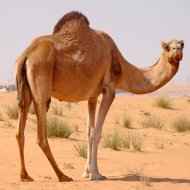
Hopes that new research will help hasten knowledge and control of MERS
The International Livestock Research Institute (ILRI) has published two new papers on MERS coronavirus and camels in Eastern Africa.
MERS was first discovered in a Saudi Arabian patient in 2012. It is a severe respiratory disease that causes cough, fever, shortness of breath and can lead to pneumonia and kidney failure. There is currently no cure or vaccine for MERS. Since July 23, 2014, the infection has spread to over 800 people, killing almost 300. According to the US Centres for Disease Control, nearly all of the reported cases have been linked to the Arabian Peninsula.
Previous studies of the disease have found that Arabian camels can harbour the coronavirus that causes MERS. ILRI say that the similarity between MERS found in camels and in humans, suggests that camels may provide a primary source of infection of humans.
Two new papers on MERS have now been published in the science journal Emerging Infectious Diseases. In the studies, researchers from the ILRI and Kenyan partners explored the prevalence of antibodies to the MERS virus in camels in Kenya.
The first study proposed that young camels may spread the virus in camel populations and that MERS-CoV infections escalate when camel population density increases.
In the second study, a 30-year-collection of samples from East-African camels were tested for MERS coronavirus antibodies. In total, 84 per cent of all camels tested positive, a finding that supports conclusions from previous studies.
In summary, the combination of a high-population density of camels with nomadic camel farming - along with the presence of young camels who are susceptible to the virus - could increase the overall levels of the virus in regional camel populations. It may also increase the chance of the virus transmitting to humans.
The World Health Organisation (WHO) and member states are now being urged to improve national policies that address infection and control, and then implement those policies in health care facilities and systems.
WHO's Emergence Committee say say that "critical investigations should be initiated and accelerated, vulnerable countries should be supported, and better communications should be embraced to strengthen collaboration between all parties fighting the outbreak as well as to disseminate advice and warnings to the general public."



 The Veterinary Medicines Directorate (VMD) is inviting applications from veterinary students to attend a one-week extramural studies (EMS) placement in July 2026.
The Veterinary Medicines Directorate (VMD) is inviting applications from veterinary students to attend a one-week extramural studies (EMS) placement in July 2026.